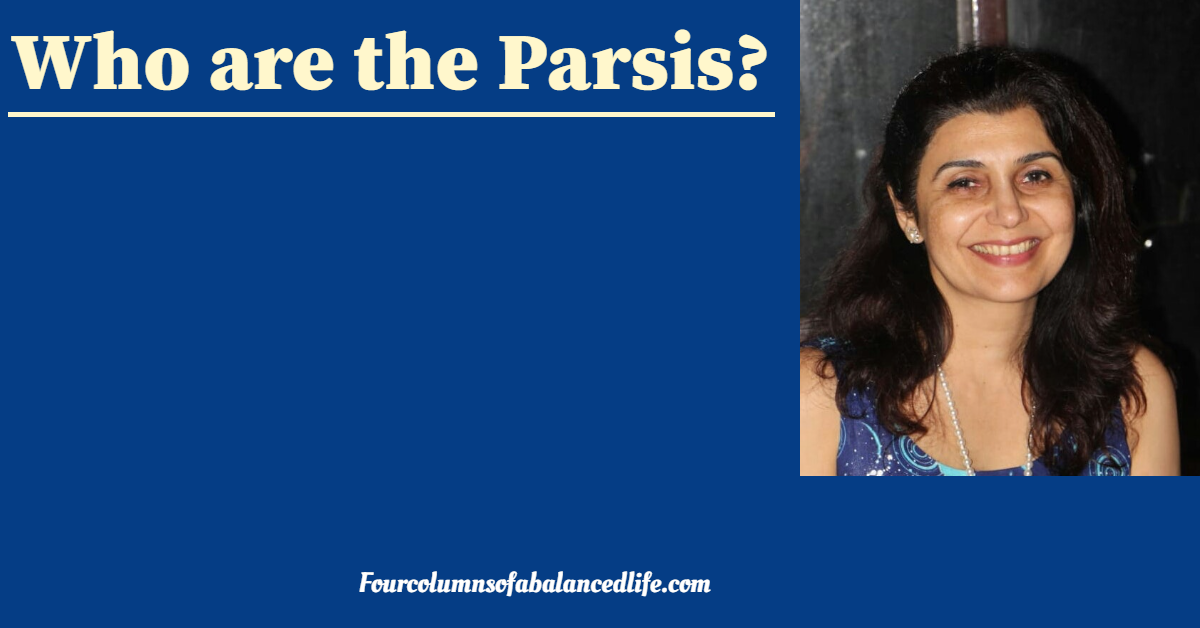Who are the Parsis

Ratan Tata, Homi Bhabha, Freddie Mercury, Persis Khambatta, Rohinton Mistry, Zubin Mehta are all Parsis.
Parsis means Persian in the Persian language. Parsis migrated to India to escape persecution between the 8th and 10th century CE. The Parsis have mingled into Indian society while keeping their own traditions, customs, and ethnic identity. There are less than 100,000 Parsis in the world. However, they are the most influential in every sphere of life.
I talk to Farzana Patel about Parsis and their culture.
Farzana, please tell my audience a little about you?
Hi, I’m Farzana. I’m from Mumbai, India. I love to read, dance, sew my clothes (when I get the time), spend time with friends and family, and drink endless cups of tea. I’ve studied Fashion Design and have worked in clothing exports.
The Parsis are one of the smallest, tight-knit and successful communities in the world, tell me a little about Parsis?
The Parsis (who follow the teachings of Prophet Zarathustra), who had highly successful and happy dynasties in old Persia for several centuries, fled from Persia when the Arabs invaded their country, as death was threatened to all Parsis who refused to convert to Islam. In the 13th Century AD, they escaped Persia in ships and landed in the Gujarat port of Sanjan, where the Hindu ruler gave them refuge and allowed them to stay peacefully. The Parsis in turn promised that their community would bond with the locals like sugar in milk.
The inculcation of philanthropy, of charity to the poor and needy is taught from an early age. To be totally honest in everything and with everybody, purity of thoughts, integrity, and the spirit of enterprise has ensured successful business enterprises globally. Parsis have opened hospitals, schools, and colleges all over the world.
Please explain Zoroastrianism to me and good and evil?
Zarathustra is the Founder of Zoroastrianism. It is the world’s oldest monotheistic faith. Zoroastrians believe in one God, called Ahura Mazda, who is the creator of the universe. The basic ethic of our faith is Good Thoughts, Good Words, and Good Deeds. If we follow this, everything else will fall into place.
Good and evil is within everyone. Each person has to make the choice to follow the one they feel most. The wearing of the sacred vest (Sadra) and sacred thread (Kusti), helps in keeping all evil thoughts at bay. The prayers our priests chant in our Fire Temples, helps ward off our evil thoughts.
In the Parsi temple there is fire, what does it represent?
The fire is a symbol of light and purity. It represents the entity of our God Ahura Mazda.
The fires in our fire Temples never go out. They are kept burning constantly. We purify the fire by the priest offering prayers at 5 set times during the day, driving away from the negativity that might be there, and in turn, the fire helps to cleanse the negative thoughts we bring with us when we go to worship.
Is there a set time, that one goes to worship, or can you go any time?
There are five fixed times during the day that are prayed by our priests in our Fire Temples. People go to pray any time that is suitable to them, though mornings are considered best. Our Fire Temples are open throughout the day.
Describe to me some festivals associated with Parsis?
The Zoroastrian calendar is full of holy days, feasts, and festivals. Our festivals are closely linked with the seasons. Our main festivals are:
Jamshedi Navroze, which is the festival to herald the beginning of Spring.
Our New Year, which happens in the month of August.
Khodad Saal, which is the birthday of our Prophet Zarathustra.
What are some foods, culture and rituals that are exclusive to Parsis?
Parsis are not just fond of food, we relish it! Most Parsis are meat lovers. They eat every kind of meat and fish. Many don’t enjoy vegetables along with it and joke that the only vegetable in their vocabulary is potatoes. In many households, if there is no kind of meat on the table, there’s an uproar! Conversations at dining tables mostly consist of what to eat at the next meal and discussing food and more food. Parsis also love their eggs, known as ‘eedu’. A popular accompaniment to all meals is a side dish of potatoes, any vegetable or meat with an egg cooked on it. Parsi food is delicious, made with many condiments, and with lots of flavors.
Parsis are fond of ‘nataks’, which are plays or short stories full of fun and jest. We love to laugh heartily at all jokes. Most Parsis are very fond of Western Classical music and love to go to concerts, plays, movies, and musicals.
Parsis follow certain rituals – they have ‘jashans’, which is a prayer of thanksgiving at their homes or in their community hall. They also have ‘Gambhars’, which are community dinners hosted by themselves or by a family as a celebration on auspicious days. On religious days and birthdays, they do colorful chalk designs on the floors outside their houses (floor art), hang garlands of fragrant flowers on doorways and serve sweet milky rava (semolina) or sweet brown sev (vermicelli) with yogurt, which is a must on such days.
How has motherhood changed you as a person and how important is family to you?
Motherhood has made me a better person. Once you’re a parent, your priorities change completely, and your focus changes to the young one you have given birth to. One becomes more patient and selfless; no sacrifice is too big when it’s done for your child. I have focused on how to bring up my son as a good human being, to show kindness to all, and have a decent education so he can stand on his feet later on. Family is everything. I have grown up having the support of very loving parents. To know that your family has got your back, no matter what is very comforting and reassuring. As I’m a single parent, I have had to make doubly sure my son knows I’m there for him any time of the day or night, but also to be independent. He has had lots of love showered on him from my immediate and extended family to know and appreciate the importance and value of family.
How do you balance faith, finance, family, and food in the 21st century?
Life has become very busy in this modern world. Although we use time-saving gadgets and devices, it is yet a constant juggle for everyone. We need to prioritize what is most important to us and find our balance from there. Faith keeps me rooted. I pray for just a few minutes a day, but I always end them by thanking God for all that He does for my family and I.
In these uncertain times, it is very important to invest wisely in our future. One can never save enough, so setting aside as much of your income that you can, is prudent.
Always make time for family. All of us have multiple groups of friends to socialize with, but I keep aside a day in the week to spend with my family. It is with having meals together and doing things together and for each other, that bonds are maintained and strengthened.
I try to eat less processed and more naturally grown foods. I read some time ago, that one should “eat what you can grow”. So, eat vegetables that are wholesome and not dried and processed, have all your meats, but not processed meat like luncheon meat, eat rice but not bread; have whole grains, but not multigrain crisps. Have foods the way they are grown. I think that makes sense and I’ve been trying to follow that. Having said that, I love chocolate and enjoy party food too, but try to eat that in moderation.
Finally, please give me the recipe for a Parsi specialty?
Patra Ni Machhi (Fish steamed in Banana Leaves)
This is a popular traditional dish served at wedding dinners. This recipe is from one of my favorite books, Jeroo Mehta’s 101 Parsi Recipes.
INGREDIENTS
2 large Pomfrets or any other sliced fish weighing 800 gm
2 tsp salt
Banana leaves or foil
INGREDIENTS FOR THE CHUTNEY – TO BE GROUND TO A PASTE
1 fresh coconut grated
1 cup fresh coriander chopped
8 green chillies (deseed or reduce them if you like it less spicy)
1 tsp cumin seeds
6 cloves garlic
2 tsp sugar
1 tsp salt
2 tsp lemon juice
METHOD
Cut the pomfret into slices.
Cut the banana leaves or foil into large enough pieces to wrap each slice of fish. Hold each banana leaf over a flame a few seconds to soften the leaf and center rib. Grease one side of each portion of leaf or foil.
Rub salt into each slice of fish.
Coat each slice of fish with chutney.
Lay a slice of fish on the greased side of a piece of banana leaf or foil and wrap it up till it is covered from all sides. Tie with thread. Do the same with the other slices of fish. Steam or bake the fish for 30 minutes or till it is cooked.
Serve the fish with the leaves or foil on. Unwrapping it on your plate, keeps the flavor and juices intact, till the time of eating.


Very interesting. Never heard of Parsis. Blog was educational.